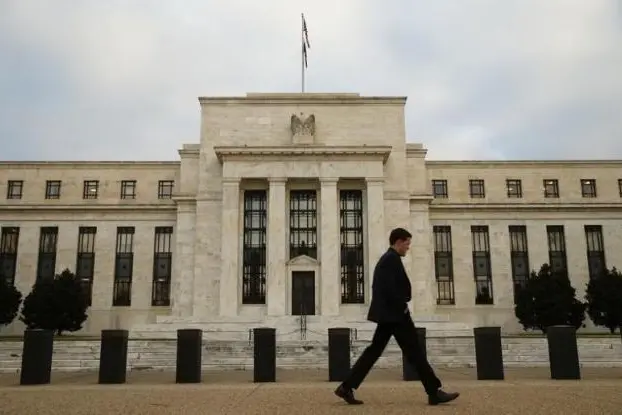PHOTO
Both U.S. and euro zone central banks will halt policy tightening next year, and equity market concerns mean investors should hold dollar cash and high-quality stocks, asset manager Carmignac says.
Didier Saint-Georges, who helps manage over 50 billion euros as Carmignac's managing director and investment committee member, told the Reuters Global Investment Outlook Summit on Thursday that 2019 would necessitate a typical "late-cycle" approach, with a concentrated portfolio.
"We're at the stage where central banks are still hiking when the economy is slowing, (which is) not a great path for investors," Saint-Georges told the summit in London.
"The only strategy to have at that stage of the cycle is to run barbell strategies," he said, referring to the practice of making two extreme investments to enhance returns.
"Liquidity in dollars shouldn't be snubbed, nor defensive stocks...My point is that at this stage of the cycle broad diversification does not work."
World markets have had a rollercoaster ride of late, with the U.S. Federal Reserve seen raising interest rates in December for the fourth time in 2018. But investors widely expect the U.S. economy and company earnings to slow in coming months as the sugar-rush of tax cuts fades.
There are also clear signs the euro zone recovery is stuttering and Chinese growth too is slowing, undermined by Washington's onslaught on trade.
Central banks have so far ignored the growth issue and the monetary policy cycle should remain unchanged for the next six months, Saint-Georges noted but predicted this to change.
"At one point in 2019 one central bank is going to throw in the towel," he said. "What I don't know is when the Fed will start to worry about the economy... Who between the ECB and the Fed blinks first is going to be a major issue."
He acknowledged that the task for the ECB - which plans to end its 2.6 trillion-euro asset purchase scheme in December - would be complicated by a leadership change. Its president Mario Draghi is set to step down next October.
Currently markets are pricing one interest rate rise in 2019, to be delivered in December of that year.
"Draghi probably is going to do nothing until he passes on the baton to someone else but at one point I wouldn't surprised if the then ECB governor says 'we won't raise rates any time soon."
Fed policy has boosted the dollar by more than 5 percent this year .DXY , its strength hammering emerging markets and triggering crises in Turkey and Argentina. But a pause in the tightening cycle should curb those gains and Saint-Georges said this would be the time to buy emerging assets again.
"When the dollar finally weakens because the Fed would throw in the towel, then – and we better not miss that moment when it comes – that would be the time to move into emerging markets," he said.
"Then you win in emerging equities, you win in currencies, but it's not for now."
He was less convinced of how British assets would play out given all the uncertainties around Brexit. Prime Minister Theresa May is battling to save a draft divorce deal with the European Union after a raft of ministers quit in protest and eurosceptic lawmakers stepped up efforts to topple her.
That pushed sterling down 1.6 percent on Thursday but the currency could still rally if London manages to avoid crashing out of the bloc without a trade deal.
Carmignac's approach is to "play convexity" -- trading the currency through options rather than direct exposure, Saint-Georges said.
"You buy call options on sterling, and if you want, buy put options. You pay a premium just to bring convexity in your portfolio because it could really go a big way in both directions."
Follow Reuters Summits on Twitter @Reuters_Summits
(Additional reporting by Dhara Ranasinghe and Ritvik Carvalho; Editing by Toby Chopra) ((sujata.rao@thomsonreuters.com;))





















